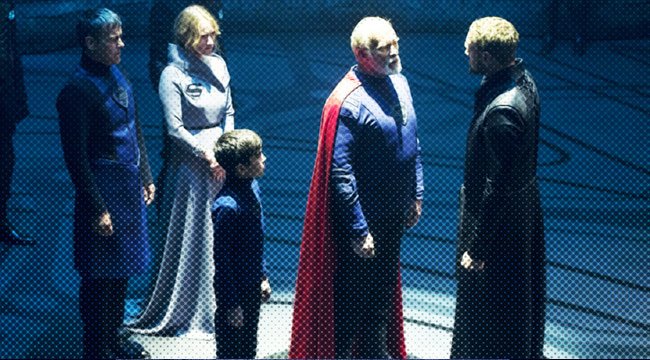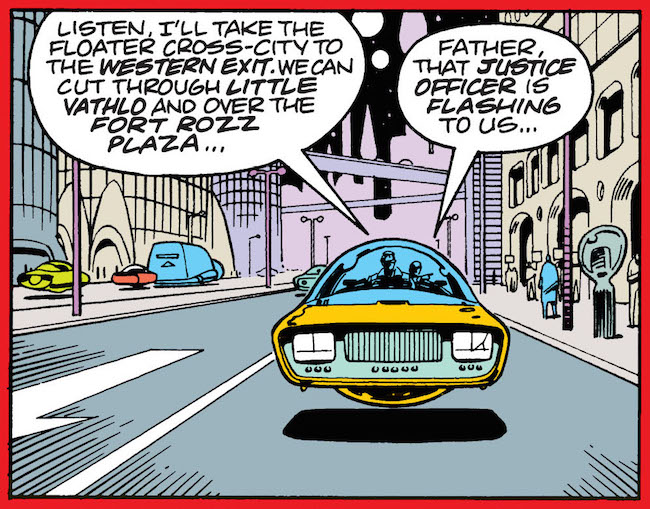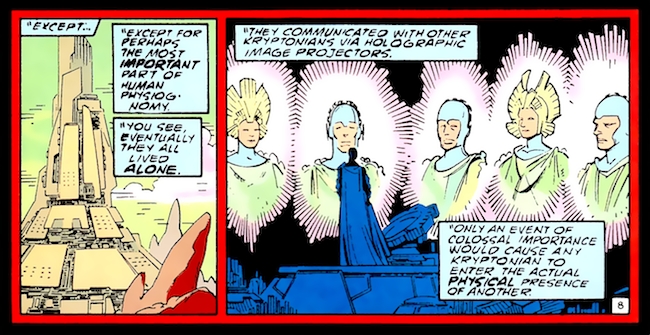
Tonight, Syfy goes to Superman’s home planet with Krypton, which follows his grandfather Seg-El as he restores the family name and gets trapped in multiple schemes and love triangles. But if you’re not a comics reader, the idea of a show about Krypton at all might be a jolt. Yet Superman’s homeworld has a fascinating history in comics, often reflecting either our dreams of what our own planet could be or our fears of what it might become.
At first, the only interesting fact about Krypton was that it blew up. In fact, the comics themselves were uninterested in Krypton, but the Superman newspaper strip, which debuted in 1939 and was worked on by an entire shop of artists led by Superman’s creators Joe Shuster and Jerry Siegel, was fascinated by it. We learned that Krypton was pretty much a far-flung future Earth, with all the wondrous technology and social advances one would expect with eons of scientific work behind it. It was, essentially, the pulp SF utopia of magazine covers and cheerful science fiction. The only thing wrong with the place was that it was so old it blew up.
And, for a long time, that was that: It was a nice place to visit, and a shame you could no longer live there. After the strip ended in 1966, with comics legend Bill Finger handling the writing duties, Krypton really only came up as a plot device; this Kryptonian city was trapped forever in a bottle, this Kryptonian survived to inspire a plot. Even in 1978’s Superman, Krypton was maybe a bit sterile, but only because it was so advanced.

Things changed in the mid-’80s. First, in 1985, there was Alan Moore and Dave Gibbons classic story “For The Man Who Has Everything,” which arrived right before they’d launch Watchmen. In it, thanks to a plant that gives your heart’s desire, Superman hallucinates he never left Krypton, and works a steady job with a family. But Superman, for all his decency, can’t quite believe in this perfect world. His disgraced father can’t deal with the fact the world didn’t end, and founds a fascist movement, the Sword of Rao. This dream Krypton fractures as a totalitarian religious movement clashes with a leftist wave determined to free prisoners they see as unjustly trapped. It’s not hard to see parallels between this Krypton and Moore’s native England.

And in 1986, John Bryne began Man Of Steel, a miniseries that reinvented everything about Superman from Smallville to Luthor. For Krypton, Bryne took Moore’s idea of a fascist state even further. By the time little Kal-El is loaded into a rocket, Krypton has become an empty husk of a society, hollowed out by wars, social strife, and fear. Eugenics has become the norm, and Superman is born without his parents even meeting, let alone touching. A vast war had extremist groups like Black Zero, who are mentioned in Syfy’s series, attempt to destroy the planet, while a religious extremist known as the Cleric used a genetic weapon to trap Kryptonians on their home planet, never to escape, forbidden to speak to other races. Kal-El escapes only because of a small spark of rebellion inside his father, who dies proclaiming love for a woman he’s barely met. Considering the Cold War was only just beginning to thaw, one has to wonder how much American views of Russia were on Bryne’s mind.
That political context has endured, in part because Superman writers are endlessly fascinated with how a superhero who embodies decency struggles with a morally grey world. A recent arc in the comics, for example, returned Krypton to the scientific utopia mold, and yet found Superman’s father, Jor-El, causing political crises and ecological disasters on Earth to “teach” his son humanity wasn’t worth saving. A Kryptonian from a perfect world, it turns out, can’t tolerate imperfection.
And Krypton itself approaches the planet from a new angle. There are the haves, and the have-nots, and much of the show’s tension comes from the fact that everything people on Krypton want, they can’t have, and what they have, they don’t want. For all the power the nobles of Krypton hold, they’re as hemmed in and controlled by a society of their own design as the slum dwellers who don’t even have surnames.
Nobody in this society is truly happy, but some of Krypton is noble enough to long for a better world. And the show seems to note, that’s all it takes. A better world isn’t easy, on Krypton, but it’s there if you want it. It’ll be interesting to see how Krypton plays this angle out. And it serves as another reminder that often, distant planets aren’t as far away from us as we think.
